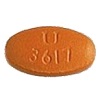
 USA/Canada
USA/Canada 
 UK
UK 
 Australia
Australia 
|
Vantin
Vantin is a cephalosporin antibiotic used to treat various bacterial infections.
Vantin 200 mg
Vantin 100 mg
Name Vantin (Cefpodoxime) Application Vantin is a cephalosporin antibiotic used to treat various bacterial infections. Mode of application The medication should be taken with food. When used in liquid form, this drug should be shaken well before using. To cure the infection completely, you must continue taking this medication throughout the treatment even if you begin to feel better after a few days. If you have a strep infection, you should continue taking this medication within 10 days. This is especially important in strep infections since serious heart or kidney disease may develop in the future, if the infection is not completely cured. In addition, if you stop taking this medicine too soon, your symptoms may return. This medicine works best when it is supported by its constant amount in the blood or urine. To do this, do not miss any doses. In addition, it is best to take doses evenly distributing them. For example, if you want to take four doses a day, take the drug after about 6 hours. If this interferes with your bed time or other daily activities or you need help, consult the doctor. Mechanism of action Cefpodoxime is an antibiotic in a class of drugs called cephalosporins. Cefpodoxime fights bacteria in the body. Cefpodoxime is used to treat many different types of bacterial infections such as bronchitis, pneumonia, tonsillitis, ear infections, sinusitis, skin infections, gonorrhea and urinary tract infection. Cefpodoxime can also be used for treatment purposes other than those listed in this medication guide. Missed dose If you miss a dose of Vantin, take it as soon as possible. If this occurred while taking your next dose, skip the missed dose and go back to your regular dosing schedule. Do not take 2 doses at once. Storage Tablets and capsules are to be stored at room temperature between 59 and 86 degrees Fahrenheit (15 to 30 ° C) and protected from moisture and sunlight. Do not store the drug in the bathroom. Liquid suspensions should be stored in the refrigerator but not in the freezer. Check the expiration date and discard any unused medication after that date. Precautions Tell the doctor your medical history, especially of: allergies (in the first place to penicillin or cephalosporin antibiotics), kidney disease, stomach problems and colitis. Use of the medication for a long time or repeated periods may lead to secondary infection (eg, oral, bladder or vaginal yeast infection). The drug should be used only if it is absolutely necessary during pregnancy. Since small amounts of this drug are stored in breast milk, consult your doctor before breast-feeding. Side effects The medication may cause stomach upset, diarrhea, and loss of appetite, nausea, vomiting and headache. If they continue or become severe, inform your doctor immediately. Other side effects include anxiety, insomnia and dizziness. Tell your doctor if any of the side effects occur. Unlikely but possible side effects: fever, easy bleeding or bruising, changes in amount of urine and seizures. Allergic reactions to this drug are unlikely to happen but seek immediate medical attention if it occurs. Symptoms of an allergic reaction include: difficulty in breathing, skin rash, hives and itching. If you notice other effects not listed above, contact your doctor. Additional information The medication is prescribed for current condition. Do not use it later for another infection treatment or transfer to other people. |
Testimonials
Thank you for wonderful servicing! I received everything I have ordered and bonus pills and discounts you have mentioned. I will recommend you to all my friends. Big thanks once again.
- Steven Hermel. Read more Why Generic?
Generic is a drug that has proven pharmaceutical, biological, and therapeutic equivalence to the brand name drug. In other words, generic has an absolutely identical content, dosage form and has the same qualities of effectiveness and safety as its branded analog.
Secured by

|
















